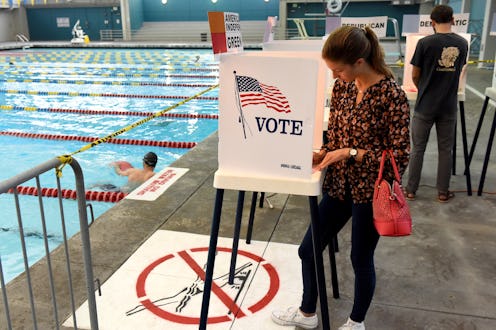News
The Ballot Selfie Is Constitutional. Breathe Easy.
In a constitutional conundrum that the framers of our nation's government could have never predicted, the ability to easily photograph and publish images of filled-out ballots — the so-called "ballot selfie" — has been a controversy in dozens of states over the last several years. But Wednesday, the ballot selfie was ruled constitutional by an appeals court in Boston. The decision overturned a New Hampshire law, which banned the polling place pics in 2014.
The ban on ballot selfies was tacked on as an amendment to a larger law that prohibited voters from showing their completed ballot to someone else — which means no posting to the internet — as a way of curtailing vote-buying. The only problem? According to the court, that wasn't happening. As Judge Sandra Lynch said at oral arguments on Sept. 12, "You have no evidence of that. None."
The role of the ballot selfie in contemporary politics is a difficult one to pin down. In an amicus brief (also known as a "friend of the court brief," a way for interested parties not directly involved with cases to let their voices be heard) filed by Snapchat on behalf of the ballot selfie takers, the company asserted that "Ballot selfies are the latest in a long historical tradition of voters sharing their civic enthusiasm — and their votes — with their social networks."
The brief went on to offer a short history lesson on publicizing one's vote and voting intentions in America.
During the nineteenth century, voting was more than casting a ballot. Election Day was a social occasion, with political parties sponsoring raucous gatherings at the polls. The public spectacle led to high voter turnout, as voters lingering to see and be seen drew in even more neighbors to vote and mingle.
...Starting with the 1896 election, voters wore their pride in the form of campaign buttons, signaling their support for candidates and causes. And in recent years, voters have flocked to the "I Voted" sticker to show their civic engagement. Whatever its form, the voter's message is the same: I'm participating in the civic process, and you should, too.
The court ultimately found that the state had violated voters' First Amendment rights, and that the state "may not impose such a broad restriction on speech by banning ballot selfies in order to combat an unsubstantiated and hypothetical danger."
"The ballot-selfie prohibition is like 'burn[ing down] the house to roast the pig,'" the decision quipped, referencing language from the 1957 Supreme Court case Butler v. Michigan, which made it unconstitutional for states to ban from the general public reading material that could be considered harmful to minors.
While the court's decision currently only affects the New Hampshire ban, perhaps by Nov. 8 (or earlier if you're in an early voting state!) we'll be able to see ballot selfies from sea to shining sea.
